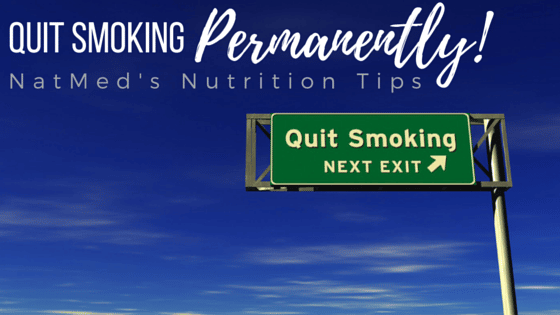How Can I Quit Smoking,
Permanently!?
Nutrition Secrets
Looking for all the help you can get to quit smoking once and for all?
And with the least withdrawal symptoms?
Understanding nutritional biochemistry can help. Here’s how…
Approach to Quitting: Withdrawal Symptoms
Understanding withdrawal symptoms before initiating an attempt to quit smoking can increase your success. Common symptoms may include tobacco craving, anxiety, nausea, headache, fatigue, drowsiness, irritability, poor concentration, frustration, weight gain and increased appetite.
Introducing a nutritional support protocol may help to reduce the severity and prevalence of symptoms associated with tobacco withdrawal and support a sustainable quitting routine.
How Can Nutrition Help? Biochemistry behind Addiction. . .
Maintaining dopamine, acetylcholine receptors and acetylcholine during the withdrawal phase of quitting may lead to better quitting outcomes. The reasoning behind this is that nicotinic acetylcholine receptors are located throughout the brain and are involved in some of the effects experienced from tobacco. Further, the mesolimbic dopaminergic system is part of the addiction pathway. Addictive substances like nicotine in tobacco can increase dopamine synthesis and secretion in the reward centres of the brain.
So how is this relevant to you? Supplements and dietary changes can help support this pathway as you phase out your nicotine intake. Specific nutrients that may help to counteract the symptoms associated with nicotine withdrawal include tyrosine, choline, glutamine, vitamin C, lipoic acid, glutathione and nutritional co-factors including vitamins B1, B3, B5, B6, magnesium, iron and zinc. Here’s how….
Nutrition Interventions
Tyrosine
Nicotine withdrawal can reflect a decrease in catecholaminergic pathways. Tyrosine, and nutrients that support its uptake (B6, B3, C, Mg, Zn and Fe) can stimulate this pathway, which results in supporting dopamine levels.
Choline
Nutritional precursors and co-factors for acetylcholine may help to reduce anxiety and have a calming effect on the autonomic nervous system during the withdrawal phase of quitting smoking. The reasoning behind this is that nicotine acts on acetylcholine receptors. Such co-factor nutrients include choline, acetyl-l-carnitine, B5, B1 and magnesium.
Glutamine
Supporting gamma amino-butyric acid (GABA) production may help to reduce anxiety and irritability associated with nicotine withdrawal. Glutamine, cysteine and B6 are key nutrients required to support the glutathione and GABA production pathway.
Antioxidants: Vitamin C and Lipoic Acid
Vitamin C is severely depleted by cigarette smoking. Increasing vitamin C and other antioxidants can help to counteract oxidative damage caused by cigarette smoking and possibly reduce tobacco cravings. In particular, vitamin C paired with lipoic acid, a potent antioxidant, can help to support glutathione production, an important nutrient involved in conjugating toxins from cigarette smoke and removing them from the body.
Tryptophan
Tryptophan can help to alleviate tobacco craving, depression, anxiety, mood swings and irritability associated with cigarette withdrawal by supporting serotonin levels within the body.
Quit Smoking Smoothie
Incorporating a daily smoothie in your routine rich in the above nutrients may help to facilitate your quitting smoking plan and manage any symptoms that may arise. Choose from the below foods and supplements to boost your smoothie.
| Smoothie ingredients that are high in: Tyrosine, choline, glutamine, vitamin C, lipoic acid, glutathione, B1, B3, B5, B6, magnesium, iron and zinc |
|
| Fruits: | Avocado, banana, pineapple, strawberry, orange, carrot, parsley, ginger |
| Vegetables: | Carrot, parsley, ginger |
| Nuts & seeds: | Sunflower, pumpkin, walnut, almond |
| Other: | Egg |
| Supplements to add: | Glutamine, whey protein, brewer’s yeast, lecithin, spirulina, cacao aloe vera juice, glutathione |

Supplements
For extra support, a qualified healthcare practitioner can recommend an appropriately dosed nutritional supplement protocol individually tailored to you for short-term use as part of your quit smoking routine.
Psychological Support
Smoking is a learned behaviour as well as a biochemical alteration. The challenges of tobacco withdrawal can be somewhat mitigated through appropriate nutritional support. However, it is important to complement nutrition therapy with psychological support in some shape or form. Consider counselling, quitting smoking programs, acupuncture, meditation or yoga.
What to do Now…
- Ensure psychological support is in place
- Be aware of the withdrawal symptoms that may present
- Reduce further stresses on the body (fast food, saturated fat, refined carbohydrates, coffee, low sleep, alcohol, psychological stress)
- Boost nutrition through smoothies or salads containing a colourful variety of fruits and vegetables, lean proteins and good quality fats
- Consider a short term supplement regime including nutrients to support the biochemical changes associated with tobacco withdrawal
If you would like support with your quitting smoking journey, call our clinic on 9339 199 to book an appointment with NatMed’s Clinical Nutritionist, Amy Lloyd.

